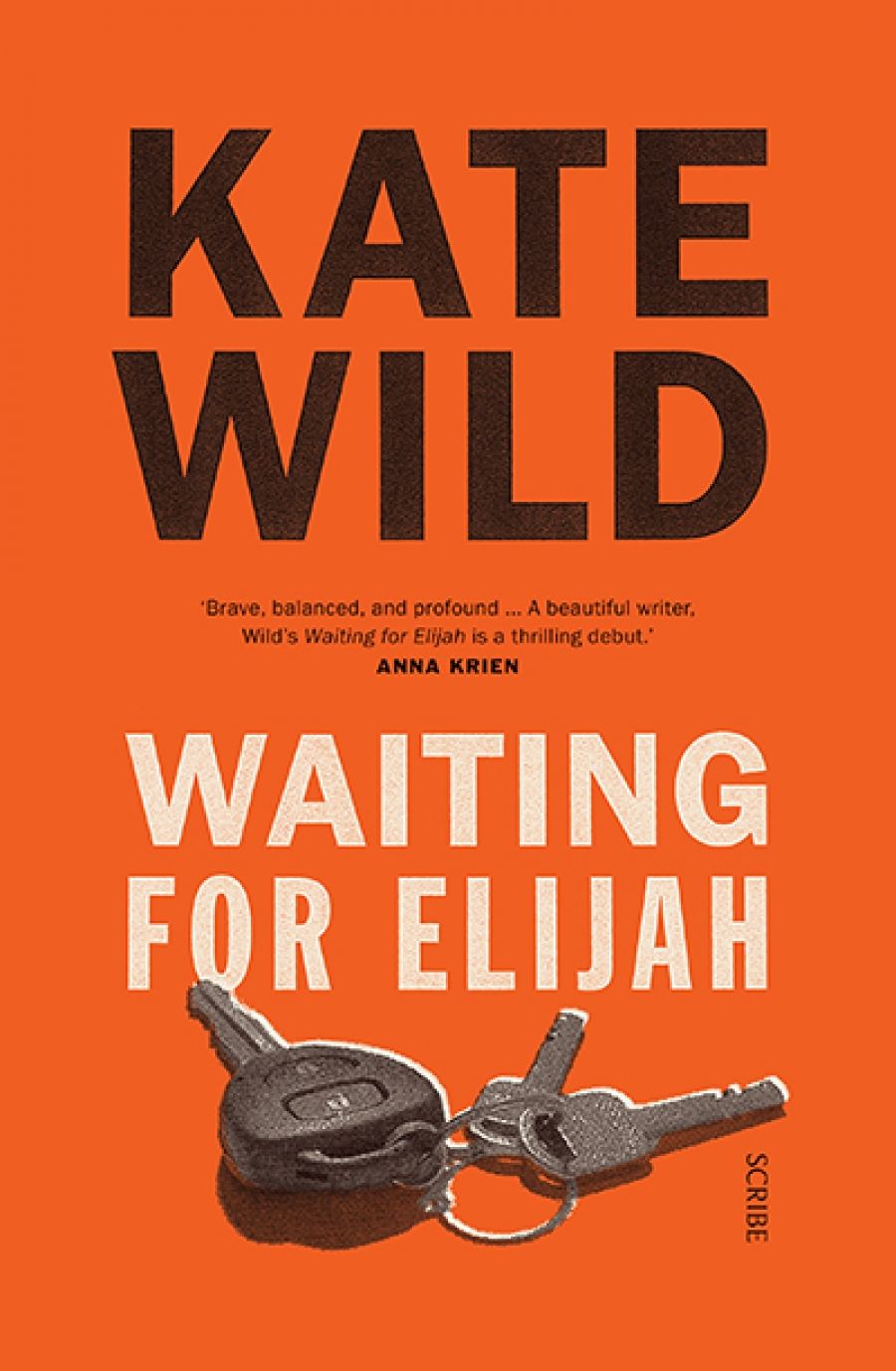
- Free Article: No
- Contents Category: True Crime
- Custom Article Title: Johanna Leggatt reviews 'Waiting for Elijah' by Kate Wild
- Custom Highlight Text:
In a 2017 essay for the Guardian, author Charlotte Wood spoke about the shame artists often feel when they discover a distinguishing characteristic in their work, something that separates them from their cohort. ‘In the beginning, and for a long time, an artist can be most embarrassed by the very thing – sometimes the only ...
- Book 1 Title: Waiting for Elijah
- Book 1 Biblio: Scribe, $35 pb, 394 pp, 9781925322736
Waiting for Elijah is Wild’s attempt to understand why Holcombe’s life ended in an Armidale laneway, hundreds of kilometres away from friends and family. Holcombe was studying psychology and philosophy at a Sydney university, and was a talented musician with a part-time job. He was loved fiercely by his family and was devoted to his young American wife, Allison, although their relationship had become increasingly strained. The question haunts Wild: why was Holcombe shot by police when he had no prior record and was, according to his family, ‘absolutely non-violent by nature’? Wild expects the story to unfold predictably: a family enraged by a ham-fisted and trigger-happy police force, and a son with a secret drug habit or history of random violence. It doesn’t take Wild long to realise the case is much more complex than that. The family refuses to indulge in feelings of bitterness – although the civil claim they launch against the police baffles Wild – and while Elijah was difficult to manage when suffering from delusional paranoia, he was also, by many accounts, sensitive and gentle.
Senior constable Andrew Rich maintains that he had no choice but to shoot Holcombe after he ran towards him with a ‘roar’ while holding a bread knife. During the coronial inquest into Holcombe’s death, five witnesses alleged that Holcombe moved two or three steps towards Rich. Four people claimed he turned to face Rich, but did not move. One said he might have stepped back, while another maintained that Holcombe turned and ran at Rich. Nine said that Holcombe did not speak at all to Rich, but two saw his lips move without hearing what he said, and one swore Holcombe said ‘shoot me, shoot me’. Wild despairs at the capacity for such a variety of recollections from witnesses who purportedly all saw the same incident.
Supplementing her reports of the inquest are Wild’s investigations into broader questions surrounding the treatment of the mentally ill within the community. We learn that the recent migration of mental health care from psychiatric institutions to community-based facilities has had widespread ramifications. It is much harder these days to schedule someone. This may protect the human rights of the mentally ill person, but can often mean that serious cases are not seen until very advanced stages. Stuart Thomas, who has as PhD in forensic mental health from Kings College, London, says that change is needed. Thomas is careful to state how remarkably compassionate many police officers are when dealing with distressed members of the public, but he argues that the ubiquitous nature of mental illness demands a review of police procedure: ‘Given half of us will experience some sort of mental illness over the course of our lives, and one in five of us will in a year, there’s arguably a systemic shift needed in the way police respond.’
 Kate WildOf course, the person Wild really wants to talk to is Senior Constable Andrew Rich, but despite emails and numerous entreaties to his lawyers, he remains tight-lipped. When coroner Mary Jerram compels Rich to the witness box, Rich says that he can’t recall the shooting, a memory gap his psychologist attributes to post-traumatic stress disorder. That Rich has been impacted by his decision to shoot that day is undoubted, but his reasons for pulling the trigger are a mystery to an increasingly frustrated Wild.
Kate WildOf course, the person Wild really wants to talk to is Senior Constable Andrew Rich, but despite emails and numerous entreaties to his lawyers, he remains tight-lipped. When coroner Mary Jerram compels Rich to the witness box, Rich says that he can’t recall the shooting, a memory gap his psychologist attributes to post-traumatic stress disorder. That Rich has been impacted by his decision to shoot that day is undoubted, but his reasons for pulling the trigger are a mystery to an increasingly frustrated Wild.
Wild’s courtroom reportage is comprehensive, sometimes laboriously so. Despite public perception of courtrooms as great theatres of emotion and activity, they are often dull places. It behoves a journalist to omit the tedious legalese and superfluous courtroom machinations, but Wild includes extraneous courtroom detail that unnecessarily pads the story. The real achievement of the book is Wild’s lyrical flair, a rare trait in a news journalist. Wild describes her mental illness as an agony that ‘would fall like a piano from the sky, unannounced and crushing’. She writes that a reply to a question ‘fell in loops at my feet, heavy and rough like rope’.
By the book’s end, Wild has received few definitive answers to her original questions, but not only have those questions changed, you get the sense she is no longer thinking in absolutes. As Holcombe’s father, says to Wild at one point, ‘There’s no black and white here, just a lot of grey.’


Comments powered by CComment